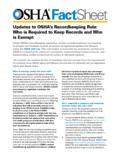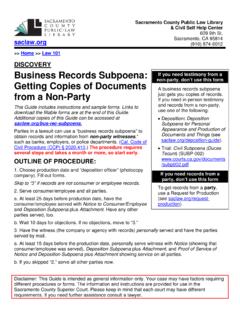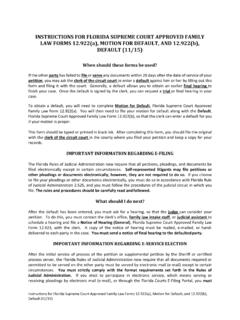Transcription of OBJECTIONS TO TESTIMONY AND DOCUMENTS AT TRIAL
1 COMMERCIAL LAW AND BANKRUPTCY SECTION. March 22, 2012. Stewart I. Edelstein Cohen and Wolf, HOW TO keep TESTIMONY AND DOCUMENTS . OUT OF THE RECORD IN FEDERAL AND STATE COURT. TABLE OF CONTENTS. Page Table of Contents ..1. Before TRIAL ..2. During TRIAL - TESTIMONY ..3. Reasons to Common OBJECTIONS as to the form of the question ..3. Common OBJECTIONS to the substance of TESTIMONY ..4. During TRIAL - DOCUMENTS ..5. Object Strategically to Questions on Direct ..6. objection to Plaintiff's Exhibits When Offers of Proof ..8. keep Out Expert TESTIMONY in Federal Court ..9. keep Out Expert TESTIMONY in State Court ..13. Page |2. HOW TO keep TESTIMONY AND DOCUMENTS .
2 OUT OF THE RECORD IN FEDERAL AND STATE COURT. You have many weapons in your arsenal to object to TESTIMONY and DOCUMENTS at TRIAL . You must be poised to object before the witness has answered each question. Object strategically, which means that you will object only when the proffered TESTIMONY or document will be detrimental to your case and you have a good faith basis to object, keeping in mind the judge's prior rulings on evidence during the course of the TRIAL . Know the evidentiary basis for each objection so you can articulate it instantaneously. Unless you object before the witness responds to a question, you are relegated to making a motion to strike, which is not nearly as effective.
3 This is a guide to the most common OBJECTIONS to seek to exclude TESTIMONY and DOCUMENTS your opponent attempts to put into the record. This list of OBJECTIONS is not intended to be all inclusive. References to the Connecticut Code of Evidence are CCE . and references to the Federal Rules of Evidence are FRE.. BEFORE TRIAL . 1. During the discovery phase, when defending depositions, object strategically to questions that are objectionable, to preserve your OBJECTIONS for TRIAL and, if the deponent is your client, instruct your client not to answer, when appropriate. 2. During the discovery phase, be vigilant about not disclosing DOCUMENTS within the attorney/client and other privileges and those protected by the work product doctrine.
4 For the scope of the work product privilege, see Fed. R. Civ. P. 26(b)(3) and CCE 13-3. If you make an inadvertent disclosure, be aware of the procedure in FRE 502. 3. Anticipate the TESTIMONY of each witness opposing counsel is likely to call at TRIAL and determine what OBJECTIONS you can properly raise. Some pre- TRIAL orders require disclosure of all such witnesses, and procedural rules require disclosure of all testifying expert witnesses [Practice Book Sec. 13-4 and Fed. R. Civ. P. 26(a)(2)]. 4. Anticipate all DOCUMENTS opposing counsel will likely seek to put into the record at TRIAL and determine what OBJECTIONS you can properly raise. Some pre- TRIAL orders require disclosure of all DOCUMENTS each side intends to put into the record, giving you advance notice of those DOCUMENTS , except for rebuttal or sur-rebuttal.
5 See the Standing Order Regarding TRIAL Memoranda in Civil Cases, item 11, in the District of Connecticut, for the mandatory pre- TRIAL disclosure of TRIAL exhibits. Page |3. 5. File motions in limine when appropriate, to alert the judge before TRIAL of key evidentiary issues, provide the judge with authorities on those issues, and seek a ruling on those issues issue before TRIAL . Be aware that often judges reserve decision on motions in limine until TRIAL , when they can consider the motion in context. It is appropriate to file a motion in limine when you seek to keep something out of the record, or get something into the record, and the evidentiary issue is sufficiently complex that a pre- TRIAL motion and supporting memo would aid the court.
6 Be mindful that filing a motion in limine also gives your opponent advance notice of the evidentiary issue and of the authorities you rely on regarding it. In state court, file your motion in limine as soon as you know who your TRIAL judge is. Do not wait until the start of evidence. 6. If opposing counsel intends to put deposition transcripts into evidence in lieu of live TESTIMONY (as when an out-of-state witness has been deposed and will not be appearing at TRIAL , a witness who has been deposed cannot attend the TRIAL , or opposing counsel seeks to put in an admission of a party from a deposition transcript), carefully review the transcript to determine what excerpts from that transcript are objectionable, for which you have preserved your right to object [Fed.]
7 R. Civ. P. 29, 30(c)(2), and 32]. In addition, get into the record other excerpts that help your case [CCE 1-5 and FRE 106, and Fed. R. Civ. P. 32(a)(6)]. DURING TRIAL TESTIMONY . Reasons to object 1. Exclude prejudicial evidence that is properly excludable. 2. Make a record for appeal. 3. Prevent unfair treatment of a witness. 4. Break up the TESTIMONY of an opposing witness, if you have a proper basis to object. 5. Reinforce your theme when objecting, unless the court does not allow speaking OBJECTIONS . Common OBJECTIONS as to the form of the question 1. leading question during direct examination, unless preliminary question or necessary to develop the witness's TESTIMONY [FRE 104(a), 611(c)].
8 2. compound Page |4. 3. ambiguous or unintelligible 4. already asked and answered 5. argumentative 6. too general or calls for a narrative answer 7. misquotes the witness or misstates prior evidence 8. assumes facts not in evidence Common OBJECTIONS to the substance of TESTIMONY 1. irrelevant [CCE 4-1, 4-2, FRE 401, 402]. 2. immaterial 3. hearsay [CCE 8-1, et seq. and FRE 801, et seq.]. 4. lack of personal knowledge [FRE 602]. 5. no foundation 6. speculation 7. waste of time or cumulative [CCE 4-3 and FRE 403]. 8. prejudice outweighs probative value [CCE 4-3 and FRE 403]. 9. confusing or misleading [CCE 4-3 and FRE 403]. 10. inadmissible opinion of lay witness [CCE 7-1 and FRE 701].
9 11. privileged [CCE 5-1 and FRE 501, 502]. 12. voir dire question beyond the scope of proper voir dire 13. cross beyond scope of direct [CCE 6-8(a) and FRE 611(b)]. 14. redirect beyond the scope of cross CCE 6-8(a) and [FRE 611(b)]. 15. improper impeachment [CCE 6-10 and FRE 613]. Page |5. 16. prior consistent statement [CCE 6-11(b) and FRE 801(d)(1)(B)]. 17. TESTIMONY admissible only for a limited purpose [CCE 1-4 and FRE 105]. 18. answer beyond scope of question (motion to strike). DURING TRIAL DOCUMENTS . 1. irrelevant [CCE 4-1, 4-2 and FRE 401, 402]. 2. immaterial 3. waste of time or cumulative [CCE 4-3 and FRE 403]. 4. no foundation 5. prejudice outweighs probative value [CCE 4-3 and FRE 403].
10 6. confusing or misleading [CCE 4-3 and FRE 403]. 7. inadmissible opinion of lay witness [CCE 7-1 and FRE 701]. 8. privileged 9. not authenticated [CCE 9-1, 9-2 and FRE 901, 902]. 10. improper copy [CCE 1-2 and FRE 1003]. 11. public record not certified or insufficient supporting TESTIMONY [CCE 9-3, 10-4. and FRE 902(1) to (5) and 1005]. 12. summary if underlying DOCUMENTS not made available as required [CCE 10-5. and FRE 1006]. 13. not disclosed as required by mandatory disclosure [Fed R. Civ. P. 26(a)]. 14. not disclosed as required by a document request to which opposing counsel did not object in the discovery phase [Practice Book Sec. 13-10 and Fed.]




